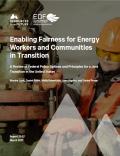This report lays out the steps that U.S. financial regulators should take now to address climate change consistent with their mandates and seize the vast opportunity of a sweeping economic transformation that can stabilize our climate while reducing long-standing social and economic inequalities.

This paper compiles findings from a series of reports that unpack existing US and European policies related to just transition. To help policymakers identify the components of a comprehensive just transition policy package, more than 100 policies have been grouped into four primary categories.
This report presents the first systematic analysis of significant emitters and examines the robustness of net zero pledges as well as their scope. It further looks for entities have components of a credible plan in place, such as interim targets, a reporting mechanism and clarity on use of offsets. This report does not assess whether such plans are internally coherent nor compatible with a global trajectory to the 1.5°C Paris Agreement target.
This paper presents three main avenues for local governments to get involved in wholesale energy market issues concerning renewable energy: through public statements, at the Federal Energy Regulatory Commission (FERC) level, and at the Regional Transmission Organization (RTO)/Independent System Operator (ISO) level. In many cases, working collaboratively can help local governments overcome barriers like limited capacity, expertise or funding.
This preview presents options to limit global temperature rise to 1.5°C and bring CO2 emissions closer to net zero by mid-century, offering high-level insights on technology choices, investment needs and the socio-economic contexts of achieving a sustainable, resilient and inclusive energy future.
